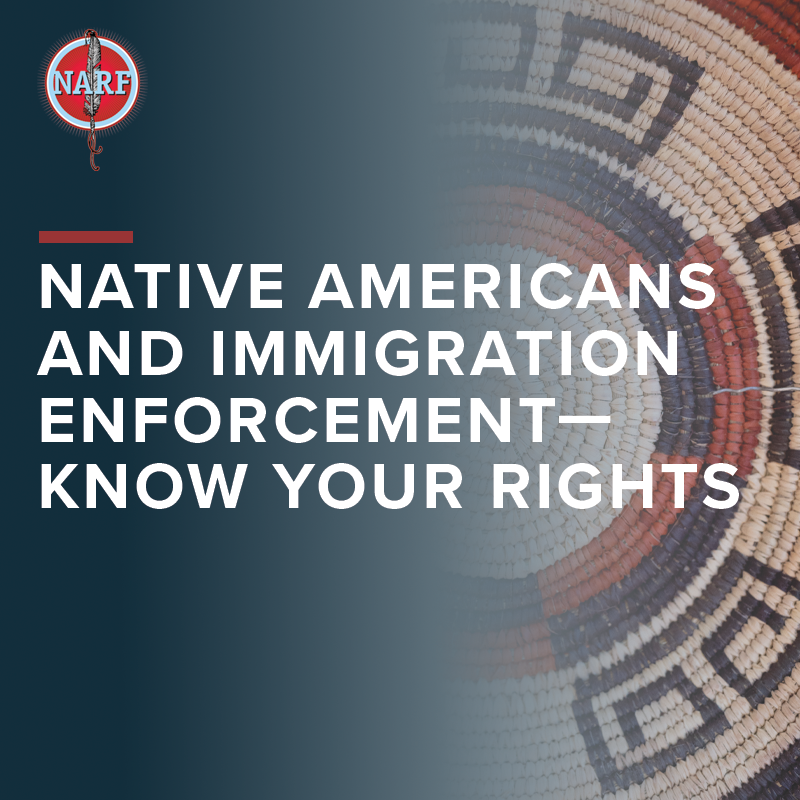
Native Americans born in the U.S. are U.S. citizens, and ICE cannot detain or deport them for immigration violations. Since 1924, federal law has guaranteed Native American citizenship. A 2025 Executive Order has ignited debates on the Fourteenth Amendment, referencing past denials of Native rights. While it does not target Native citizenship, understanding this history and knowing your rights is crucial.
In conjunction with the ACLU, we have developed a FAQ sheet on this issue:
I’m a Native American born in the United States. Am I a citizen?
Yes. Under longstanding federal law, Native Americans born in the United States are citizens of the United States.
What action is the Trump Administration taking to restrict citizenship?
On January 20, 2025, President Trump issued an Executive Order entitled “Protecting the Meaning and Value of Birthright Citizenship,” which seeks to strip citizenship from children born in the United States to parents who are not citizens or lawful permanent residents. That Order, which the President issued amid numerous other anti-immigrant actions, focuses on the Citizenship Clause of the Fourteenth Amendment to the Constitution, which guarantees birthright citizenship.
What does that have to do with Native American citizenship?
The Citizenship Clause was ratified in 1868, so how people understood the Clause at that time is important. In an 1884 case called Elk v. Wilkins, the U.S. Supreme Court held that a Native American born to tribal member parents did not qualify for birthright citizenship under the Fourteenth Amendment. In an 1898 case called Wong Kim Ark, the Supreme Court reaffirmed Elk. Although that history is relevant to understanding the Fourteenth Amendment, it is not relevant to Native American citizenship today. Since 1924, Congress has guaranteed birthright citizenship to all Native Americans born in the United States.
I am a Native American born in the United States. Can I be arrested by ICE or deported?
No. Native Americans born in the United States are citizens. Therefore, ICE does not have the authority to arrest you for immigration violations or deport you.
What should I do if law enforcement questions my citizenship?
If ICE questions you, you have the right to remain silent and to refuse consent to any search. If you are concerned about being stopped and questioned, you may want to carry your Tribal ID, state ID, driver’s license, certificate of degree of Indian blood, or other forms of identification (such as a U.S. passport) as evidence of your citizenship. Also, if ICE knocks on the door of your home, you do not have to open the door, absent a valid warrant signed by a judge.
Is the government trying to take away my citizenship?
No. This Executive Order does not attempt to strip Native American birthright citizenship.
So why is the government talking about Native Americans and citizenship?
In lawsuits challenging the Executive Order, the federal government’s legal papers have referred to historical periods when Native Americans were not guaranteed citizenship by birth. This is relevant to understanding the Constitution’s language. But no one, including the Trump Administration, is trying to strip the citizenship of Native Americans today. Nor would there be any basis to do so.
Is the struggle for the rights of noncitizens’ children today connected to the ongoing struggle for Native rights?
Yes! The fight for the rights of marginalized communities has always been connected. From Dred Scott to John Elk to Wong Kim Ark—it is the joint struggle of minority and immigrant communities that have led to our established interpretation of the Citizenship Clause of the 14th Amendment. Historically, as far back as 1898 when the Wong Kim Ark case was decided, there have been unsuccessful attempts to narrow the interpretation of the Citizenship Clause and other parts of the Fourteenth Amendment. This often involves an old tactic of pitting one marginalized group against another to create division—for example, saying that the Fourteenth Amendment was only meant to help African Americans, so the children of immigrants are not birthright citizens. But communities, including Native Americans and immigrants, are always stronger when we fight for justice together.
Where can I learn more about this case and my rights?
You can find further information about your rights when encountering immigration officials here. You can find information about Native American citizenship here, and information about NARF’s work to protect Native American rights here and Native voting rights here. You can learn more about the ACLU’s Indigenous Justice work here, and you can learn more about the ACLU’s lawsuit challenging President Trump’s Executive Order on birthright citizenship here.


